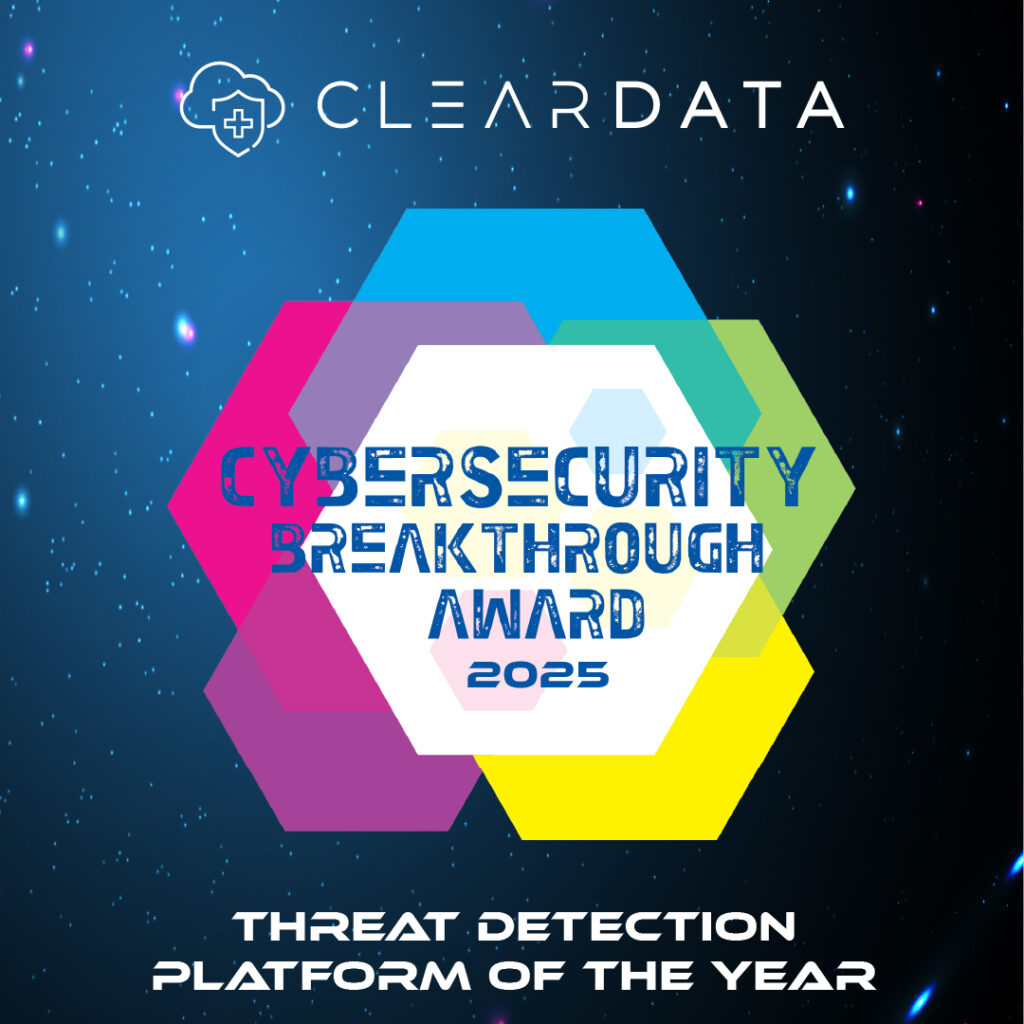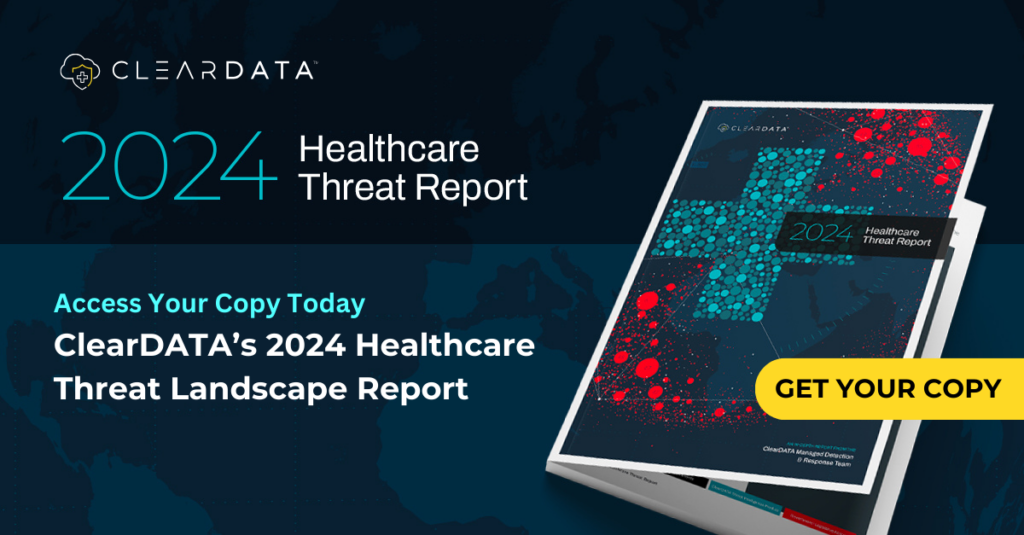ClearDATA 2025 Predictions: Why Partnering with Cybersecurity Experts Makes Sense for Healthcare in 2025
2025: A Tipping Point for Healthcare Cybersecurity?
By Jim Ducharme, CTO, ClearDATA
Cybersecurity is no longer just a back room IT issue – it has evolved into a cornerstone of patient safety and trust in healthcare. As we approach 2025, the convergence of technological innovation, relentless cyber threats, and regulatory complexity demands a new level of attention in defending sensitive data and critical systems.
The question facing healthcare leaders isn’t just how to respond to cyber threats, but how to prepare for a future defined by advancements like AI, cloud computing, and sophisticated attacks.
Resilience needs to become a cornerstone of this preparation. It’s no longer enough to focus solely on security and compliance – but healthcare organizations need systems and partners that help them adapt, recover, and maintain reliability in the face of disruption.
Operating efficiently and reliably in the cloud is critical to this goal. Achieving it requires continuous monitoring to ensure systems function as expected, alongside the agility to respond to potential issues before they escalate.
Partnering with experts who provide 24/7 monitoring and response capabilities can be a strategic advantage in building this resilience. Such partnerships allow healthcare organizations to mitigate risks and address operational challenges in their cloud environments without the resource burden of maintaining a dedicated, around-the-clock team. By leveraging specialized expertise, organizations can create a more robust infrastructure, ensuring they’re not only prepared for today’s threats but positioned to thrive in a future of change.
The Evolving Threat Landscape
Cyberattacks on healthcare organizations have become all too frequent and advanced. Ransomware continues to dominate as a primary threat, exploiting the value of patient data and the critical nature of medical services.
But 2025 is set to bring even more challenges. Sophisticated threat actors are leveraging AI to bypass traditional security measures, launching adaptive attacks that are harder to detect and neutralize.
AI-driven threats can dynamically alter their strategies, making it difficult for in-house teams to stay ahead. For example, malware can now evolve in real time, bypassing defenses that worked just weeks prior. Combine this with the growth of cloud computing, which exponentially increases the volume and complexity of data to secure, and it’s clear that traditional methods of cybersecurity are insufficient.
For healthcare providers, trying to manage these threats internally is like playing an endless game of whack-a-mole while also trying to deliver quality care. It’s an impossible balancing act without external support.
The Power of AI and Cloud Partnerships
Rather than viewing AI and cloud computing purely as risks, healthcare organizations can leverage these technologies through partnerships with specialized cybersecurity providers. AI-powered security tools, for instance, can analyze vast amounts of data to detect anomalies, predict threats, and automate responses-capabilities that are beyond the reach of most in-house teams.
Meanwhile, cloud-based security solutions offer scalable and flexible protection. Partners specializing in cloud security can provide hardened environments, pre-configured compliance standards, and real-time monitoring to ensure healthcare organizations stay protected while maintaining operational efficiency.
These partners operate with an industry-wide lens, offering insights into emerging threats across the healthcare landscape.
Think of your organization’s cybersecurity strategy like protecting your home in a neighborhood watch. The threats you face are unique to your environment. For example, a rural homeowner might worry about coyotes while city dwellers would never be concerned with that kind of wildlife, but instead focus on fast-moving traffic.
Partnering with a security expert shifts your focus from theoretical, broad-spectrum threats to those that are relevant to your organization. A partner will monitor attack trends across their client base, pooling data to identify vulnerabilities that are being actively exploited- perhaps your equivalent of coyotes in the backyard.
This real-world intelligence allows healthcare organizations to prioritize their defenses, focusing time and resources on the most pressing threats rather than chasing every hypothetical vulnerability. With the flood of risks in the modern threat landscape, understanding what’s actively happening “in your neighborhood” is critical. A strong partner will provide visibility into patterns of exploitation and offer actionable insights, helping address the vulnerabilities that pose the highest risk to your specific operations.
By leveraging expertise, healthcare organizations can move beyond reactive compliance measures and adopt a more resilient, proactive approach to security. Partnership ensure that cybersecurity efforts are not just efficient but also effective, safeguarding patient data and maintaining operational continuity in an increasingly complex digital world.
The Regulatory Tightrope
Compliance with stringent regulations like HIPAA has always been a challenge, but as cyber threats evolve, so do the requirements for securing patient data. Healthcare providers must now demonstrate not just compliance but also proactive risk management.
AI and cloud computing will play pivotal roles in meeting these heightened expectations. Predictive analytics powered by AI can help organizations identify compliance gaps before they result in penalties. Similarly, cloud-based tools can provide real-time audit trails, ensuring that healthcare providers always remain audit-ready. However, implementing and managing these solutions effectively often requires expertise that in-house teams lack.
Partnering with cybersecurity experts enables healthcare organizations to navigate this regulatory complexity with confidence. These partners bring a deep understanding of compliance requirements and can help build security frameworks that are both robust and adaptable to changing standards.
Focus on What Matters Most
The goal for any healthcare provider is improving patient outcomes. Yet, the growing complexity of cybersecurity diverts resources and attention away from this core mission. By outsourcing certain cybersecurity functions to experts, organizations can free up internal teams to focus on delivering care while ensuring their systems remain secure.
This doesn’t mean relinquishing control. Strategic partnerships allow healthcare providers to retain oversight of their security posture while leveraging external expertise where it’s needed most. For example, partners can manage cloud security, implement AI-driven threat detection, and provide actionable insights into emerging risks-creating a resilient cybersecurity ecosystem that supports, rather than distracts from, patient care.
2025: A Tipping Point
As we move into 2025, the cybersecurity challenges facing healthcare will only intensify. Advanced technologies and innovations will continue to transform both the tools available to defenders and the tactics employed by attackers. Meanwhile, the stakes-patient safety, data integrity, and operational continuity-will remain higher than ever.
This year represents a tipping point where healthcare organizations must decide whether to evolve their cybersecurity strategies or risk falling behind. The complexity of threats, from adaptive malware to AI-enabled attacks, will outpace the capabilities of most internal IT departments. By partnering with trusted cybersecurity providers, healthcare organizations can stay ahead of these challenges, benefiting from cutting-edge solutions, industry-wide insights, and the resilience needed to thrive in an unpredictable landscape.
In 2025, the path to success lies in embracing the right partnerships, technologies, and strategies to safeguard what matters most.
Industry executives and experts share their predictions for 2025. Read them in this 17th annual VMblog.com series exclusive.


